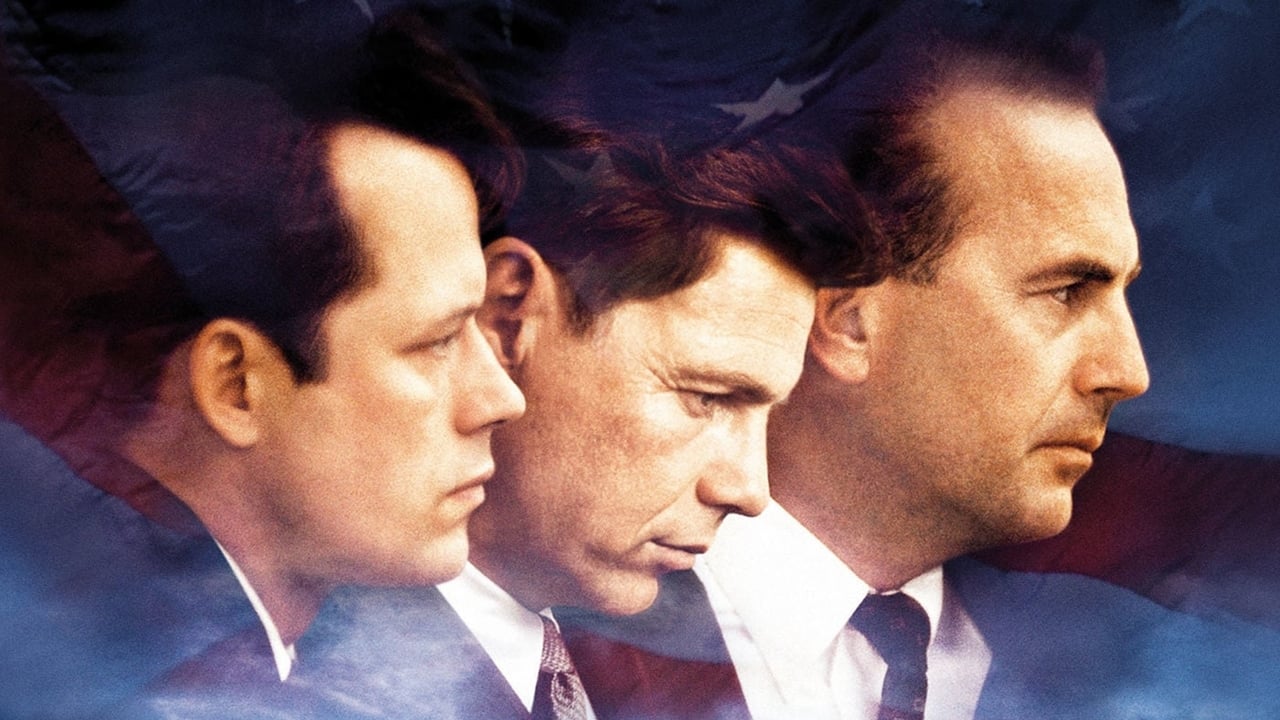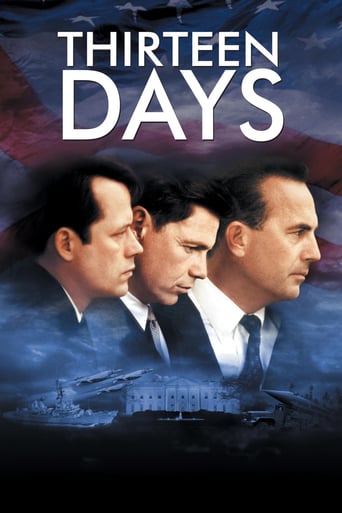

Truly Dreadful Film
... View MoreMost undeservingly overhyped movie of all time??
... View MoreLack of good storyline.
... View MoreA movie that not only functions as a solid scarefest but a razor-sharp satire.
... View MoreIn October 1962, the United States and the Soviet Union were on the verge of war over Soviet missile installations in Cuba. Based on President John F. Kennedy's tapes and a script by David Self, Roger Donaldson's outstanding film, "Thirteen Days," effectively recreates that tense Cold War period. Told from the perspective of JFK's White House, including the president; his brother Robert, the Attorney General; and the Special Assistant to the President, Kenny O'Donnell; the film is largely dialog driven. Evidently based on actual conversations, cabinet meetings, and confrontations between the administration and the military, the proceedings have the ring of truth. Kevin Costner, who also co-produced, heads the cast as O'Donnell; his effective low-key performance communicates the stress of his unique job situation and the toll it takes on his family and private life. In one particularly effective scene, Costner stands outside a church, where a line of parishioners are waiting for confession; a sign says that confession is available throughout the night, and, after a pause, Costner joins the line.Bruce Greenwood and Steven Culp play John and Robert Kennedy, respectively; both actors bear a passing resemblance to the Kennedy brothers, and, with Boston accents, they quickly submerge themselves into their parts, and the leads are well supported by a cast of pros, who portray a who's who of Kennedy administration officials familiar to any Baby Boomer who lived through the Camelot era; among them, Dylan Baker as Robert McNamara, Michael Fairman as Adlai Stevenson, and Len Cariou as Dean Acheson are worth mentioning.Although the film's ending is already part of history, "Thirteen Days" remains engrossing, often tense, suspenseful, and fast paced. An excellent score by Trevor Jones punctuates the action, and the footage shifts from color to black and white in a seemingly arbitrary manner; however, whatever the intention, the shifts neither add nor detract from the movie. Stock footage depicts civil defense preparations, and shots of nuclear explosions foretell what could occur if the negotiations between the U.S. and the Soviets had failed. Donaldson avoids claustrophobia by cutting from the White House to action in the skies over Cuba and events at sea as the U.S. blockade of Cuba takes effect. An excellent film that is well made and well performed, "Thirteen Days" is more than a history lesson; it is a warning as well. The film would make a good double bill with Costner's earlier Kennedy movie, "JFK."
... View MoreIf you lived through the era, you knew things were tense. Average people were getting ready, preparing to meet their Maker. If anything, the film paints an even grimmer picture than anyone outside of the Kennedy Administration inner circle could have contemplated, with the entire world a stone's throw away from the brink of nuclear war.It seemed to me that the events as depicted in the story were fairly accurate historically. What particularly impressed me the first time I saw this movie, which was reinforced again when I watched it the other night, was how forceful John F. Kennedy (Bruce Greenwood) was in facing down his generals to avoid a military confrontation right from the outset. The same with Robert McNamara (Dylan Baker) as Secretary of Defense in his row with the Admiral who ordered the 'star missiles' to be fired as a warning.However of all the names mentioned in the story who were part of Kennedy's cabinet, along with the principal military leaders of the time, the one name that didn't offer a hint of recognition was that of Ken O'Donnell (Kevin Costner), who in this picture was accorded as much significance as that of JFK and brother Bobby (Steven Culp). I chalk that up to Costner being one of the movie's producers, and if I'm all wrong about that, so be it. I thought the character had an important presence in the story, but have to wonder if the real Ken O'Donnell would have had as much influence with the brothers Kennedy.Considering the real world paranoia that gripped the world during this thirteen day span of time during October, 1962, an interesting contrast can be made against the fictional story presented in 1964's "Fail-Safe", about an accidental launching of an American nuclear missile strike against Russia with no hope of retrieval. Filmed just a couple short years following the Cuban Missile Crisis, the story is a real nail biter with an unbelievable resolution intended to 'even out the destruction' between military super powers. If you haven't seen it, check it out.One note of irony in this film's casting, that of Stephanie Romanov as Jackie Kennedy. Although her mother was American born, her father was of Slovakian descent, with a last name that most anyone would mistake for Russian. I wonder if anyone connected with casting on the picture thought about that.
... View MoreThirteen Days (2000)Plot In A Paragraph: The Kennedy administration's struggle to contain the Cuban Missile Crisis in October 1962.I think this is a brilliant movie, filled with great performances. Bruce Greenwood as JFK and Steven Culprit as Bobby Kennedy. It is another less is more performance from KC, and he does not steal the limelight from his costars. Every performance in this movie is as flawless as you can get. It's well shot, has amazing tension, whilst the score is another winner too!! This was not only KC's best reviewed movie in years, he also revived great reviews. Gripping, excellent thriller, Fascinating, Terrifically engrossing were all terms I heard/read in relation to this movie, but for some reason nobody went to see it. I remember when it was nominated for the critics choice for best movie, I thought it may be a movie the Oscars love but didn't find an audience, but from memory, it didn't garner a single nomination. I urge everyone who has not seen it, to check it out.
... View MoreThe 1962 Cuban Missile Crisis seen through the eyes of President assistant Kenny O'Donnell (Kevin Costner who hands perfectly the role )as trusted confidante and with significance importance of Robert Kennedy ( Steven Culp who bears remarkable resemblance )and of course President John F . Kennedy ( a solid Bruce Greenwood ) . This interesting film widely develops the Cuban Missile Crisis that was a confrontation between the Soviet Union, Cuba and the United States in October 1962, during the Cold War. The picture is packed with suspense , drama , historical deeds and is quite entertaining . It's correctly based on facts and the few sacrifices of accuracy are realized in the sense of of dramatic license . The motion picture is very well directed by Roger Donaldson who formerly worked with Costner in another suspenseful movie and also plenty of political intrigue titled ¨No way out (87) ¨ .Adding more details over the widely depicted on the movie the events happened of the following manner : In September 1962, the Cuban and Soviet governments began to surreptitiously build bases in Cuba for a number of medium- and intermediate-range ballistic nuclear missiles (MRBMs and IRBMs) with the ability to strike most of the continental United States. This action was subsequent to the 1958 deployment of Thor IRBMs in the UK and Jupiter IRBMs to Italy and Turkey in 1961; more than 100 U.S.-built missiles having the capability to strike Moscow with nuclear warheads. On October 14, 1962, a United States U-2 photo-reconnaissance plane captured photographic proof of Soviet missile bases under construction in Cuba.The ensuing crisis ranks with the Berlin Blockade as one of the major confrontations of the Cold War and is generally regarded as the moment in which the Cold War came closest to turning into a nuclear conflict .The US President ( Bruce Greenwood) , Attorney General Robert Kennedy (Steven Culp ),State Secretary Robert McNamara ( Dylan Baker ) and his military staff ( Bill Smitrovich , Ed Lauter , James Karen , Len Cariou) and general Curtis LeMay (Kevin Conway ) considered attacking Cuba via air and sea and settled on a "quarantine" of Cuba. The U.S. announced that it would not permit offensive weapons to be delivered to Cuba and demanded that the Soviets dismantle the missile bases already under construction or completed in Cuba and remove all offensive weapons. The Kennedy administration held a slim hope that the Kremlin would agree to their demands, and expected a military confrontation. On the Soviet end, Nikita Khrushchev wrote Kennedy that his quarantine of "navigation in international waters and air space to constitute an act of aggression propelling humankind into the abyss of a world nuclear-missile war." Fidel Castro encouraged Khrushchev to launch a preemptive first-strike nuclear attack on the U.S. The Soviets publicly balked at the U.S. demands, but in secret back-channel communications initiated a proposal to resolve the crisis. The confrontation ended on October 28, 1962 when President John F. Kennedy and United Nations Secretary-General U Thant reached an agreement with Soviet Premier Nikita Khrushchev to dismantle the offensive weapons and return them to the Soviet Union, subject to United Nations verification, in exchange for an agreement by the United States to never invade Cuba. The Soviets removed the missile systems and their support equipment, loading them onto eight Soviet ships from November 5–9. A month later, on December 5 and 6, the Soviet IL-28 bombers were loaded onto three Soviet ships and shipped back to Russia. The quarantine was formally ended previously on November 20, 1962. As a secret part of the agreement, all US-built Thor and Jupiter IRBMs deployed in Europe were deactivated by September 1963.The Cuban Missile Crisis spurred the creation of the Hotline Agreement and the Moscow-Washington hot line, a direct communications link between Moscow and Washington .
... View More